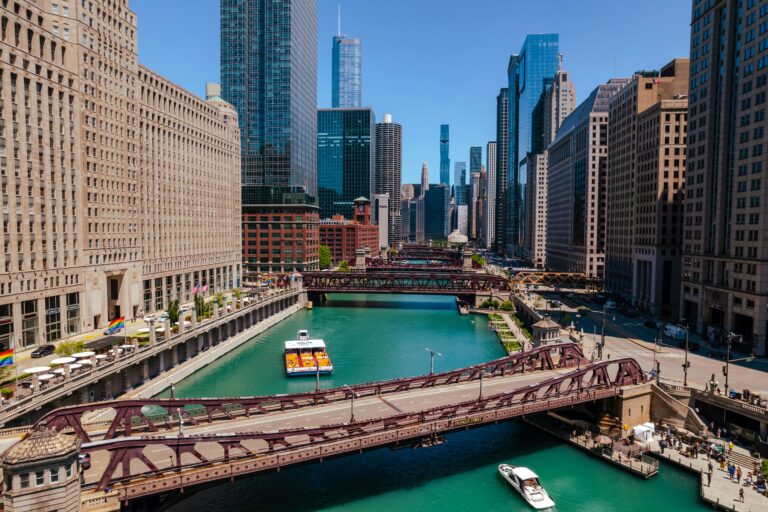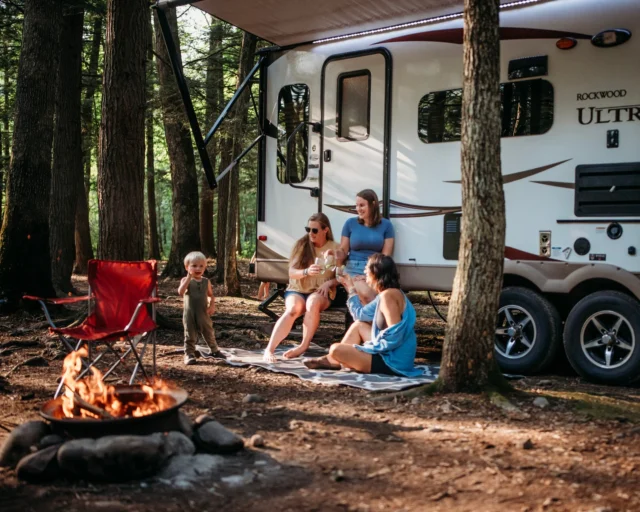
It’s natural to have questions about RV living full time in Illinois if you’ve never done it before. Fear not, for nearly all of your questions will be answered, including those about insurance requirements, where and how long you can stay, and rules about trailers.
Please note that this is not an official source of information, and rules and regulations may have changed since the writing of this article. Please always check with your local authorities before making any long-term decisions and if you are unsure of your local laws.
Can You Live in an RV Full Time in Illinois?
In Illinois, the basic law is that you may live in your RV full time. There are, however, municipal regulations that might be different, so if you pick a town in which to live in your RV full time, then you will have to check with the municipal government for any relevant rules.
As an example of a municipal regulation, the city of Aurora states that you if you have an RV on your property, it must be parked either in the side or rear yard of the property. Further, it may be no closer to the rear lot line than 5 feet and no closer to the side lot line than 3 feet. Also, the RV must be at least 6 feet removed from the wall of any structure on the property. A second example would be Clinton County, which prohibits living in your RV full time as a primary residence. However, there are 137 campsites spread out among 16 state parks and wildlife areas in Illinois that accept long-term RV camping.
Rules and Regulations for RVing in Illinois
The State of Illinois has regulations for RVing, long-term or otherwise, that contain clear language about what is and what is not allowed regarding parking, trailer towing, boondocking, etc.
RV Parking Laws
Illinois rules about parking include not stopping within 15 feet of a fire hydrant, 20 feet of a crosswalk, 30 feet of a traffic light or stop sign, or 50 feet of a railroad crossing. You’re also not allowed to stop on any road if stopping off of the road is not both practical and safe.
Trailer Towing Laws
If you have a fifth wheel, toy hauler, travel trailer, popup camper, or other nonmotorized RV in Illinois, then the rules stipulate that you must have a special license plate for it. You need a Class-C driver’s license for any trailer that weighs more than 16,000 pounds but less than 26,000 pounds. You need the same kind of license if your trailer weighs more than 10,000 pounds in any case. If you’re pulling a trailer that weighs fewer than 10,000 pounds, and your vehicle weighs more than 26,000 pounds, then you need a Class-B license. If your vehicle weighs more than 26,000 pounds and you are pulling a trailer that weighs 10,001 pounds or more, then you need a Class-A license. You trailer also needs all applicable lights and reflectors based upon its weight.
Boondocking Regulations
Generally, you can boondock in Illinois in the national forests or in many of the state parks. The principle of “leave no trace” applies in all instances. Some cities, such as Pawnee, allow boondocking on private property with the permission of the owner. It’s highly advisable to check with the municipal government of any town where you’d like to boondock.
RV Insurance Requirements
Illinois requires both liability insurance and uninsured motorist insurance for all vehicles that have their own motors. Trailers are covered under the policy on the towing vehicle. You have the option of purchasing additional coverage on both your towing vehicle and your trailer as well.
Rules for Camping on Public Land
Federal land in Illinois, such as that of Shawnee National Forest, has the same 14-day policy during any period of 28 days that applies in all other cases regarding federal land. Shawnee National Forest Campground doesn’t take reservations, but you may have up to two vehicles in your campsite. The campground is generally open from April 1 until December 15. Many state parks in Illinois provide both dispersed camping opportunities and those with amenities too.
Full-Time RVing in Chicago
There are quite a few private RV campgrounds, resorts, and parks in Chicago. The perks of living in Chicago include world-class food, fun professional sports teams to cheer for, and a rich cultural heritage that includes exemplary museums and a top-notch symphony orchestra.
RVing in Chicago FAQs
Can you park an RV anywhere in Chicago?
If your RV is more than 22 feet long, then you’re not allowed to park it on a street in Chicago.
Can I live in my RV on my property in Chicago?
Chicago follows the same rules as the rest of Illinois regarding living on your own property. You should, however, check with the municipal government before heading to Chicago just to make sure that there aren’t any new regulations of which you are unaware.
Full-Time RVing in Springfield
The No. 1 perk of living in Springfield is that you can visit the Abraham Lincoln Presidential Library. There are also other museums, botanical gardens, and a zoo for you to visit and explore. The RV camping at private campgrounds is also first-rate.
RVing in Springfield FAQs
Can you park an RV anywhere in Springfield?
No, you may not park an RV or a trailer outside of a designated RV campground, resort, or park. There are exceptions, such as you are allowed to stop for one hour for any emergency.
Can I live in my RV on my property in Springfield?
Like Chicago, Springfield follows the rules of Illinois. Check with the city government, however, before you arrive. Something might have changed, and you’ll need to know about it if it has.
How to Live in an RV Full Time
When you decide to live in an RV full time, it’s good to have a plan already in place for how it’s going to go. As you move from place to place around the country, it’s good to be flexible because of the different laws that apply in different states. Once you decide to settle in Illinois, then you can begin to build a life there. You’ll need to start by making Illinois your “domicile.” That means that you’ll create an address in Illinois and then receive your mail there rather than in any place you lived before. Generally, this will be a post office box, which allows you to be more flexible than a permanent address.
When it comes to voting, remember that you’ll be considered an Illinois resident. As an Illinois resident, you’ll also need to get a new driver’s license and other identification that you need.
You’ll also need to arrange for medical care, so it’d be a good idea to find a family doctor and register as new patients before you arrive in Illinois. That way, you’ll be able to make appointments right away instead of having to wait. Health insurance is important, too, because you never know when either you or a family member will need hospitalization or a visit to the emergency room. Having such insurance will give you peace of mind regarding your family’s healthcare.
You also might need to find work. If you decide to telecommute for your job, then you’re going to need unlimited internet service from a powerful mobile hot spot in case there’s no public Wi-Fi where you’re going to be staying. You can also choose to work for a company near where you’re staying. Depending on how long you decide to stay, that could be seasonal work or even a permanent job. Sometimes, RVers will work for the owner of the campground where they’re staying, often for deferred rental fees in addition to other forms of payment.
Types of Properties You Can Live on Full Time in an RV
• Long-term campgrounds: Remember, there are at least 16 long-term campgrounds in Illinois that can accommodate you.
• Private property: You may live on private property in your RV with the owner’s permission unless the municipal ordinances prohibit or restrict that kind of RV living.
RVing in Illinois FAQs
Can you sleep in an RV while traveling through the U.S.?
According to the Illinois Department of Transportation (DOT), there are 1,500 truck and RV parking spaces at the state’s 53 rest areas, which offer 24-hour access. The DOT highlights that the rest areas are a safe space for drivers to combat fatigue on Illinois’s roads.
What is the new RV law in Illinois?
Some of the new laws in Illinois include needing to register your RV within 45 days of arrival and the new prohibition against video conferencing while driving.
Is it legal to live in an RV full time in Illinois?
Yes, it’s legal, but you must abide by all municipal zoning restrictions and other laws regarding private property in the city, town, or village where you set up.
Can I park my RV on my property in Illinois?
As long as you comply with all relevant municipal laws regarding the practice, you may live in your RV on your property full time.
Can I buy land and live in an RV in Illinois?
The law governing living on land that you just bought is the same as that regarding other private property.
How long can I stay at an RV Park in Illinois?
Illinois doesn’t stipulate how long you’re allowed to stay at private RV parks, campgrounds, or resorts. Each private RV park, resort, or campground is empowered to make its own rules regarding how long its guests are allowed to stay.
Illinois provides many opportunities for RV living full time, including long-term campgrounds, national forest campgrounds, and many state parks. Always check the municipal laws before settling down in your RV in any city, village, or town. Remember to take care of your pets’ interests when choosing an RV campground. What do you think of the idea of full-time RV living in Illinois? Is it for you? If not, then perhaps you can rent an RV to see how you like the lifestyle. If you do like it, then pack up, and head to Illinois to enjoy everything the state has to offer RVers.






